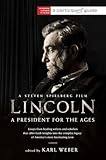Lincoln : a president for the ages / edited by Karl Weber.
Material type: TextPublication details: New York : Public Affairs, 2012.Description: ix, 273 p. : ill. ; 24 cmISBN:
TextPublication details: New York : Public Affairs, 2012.Description: ix, 273 p. : ill. ; 24 cmISBN: - 9781610392631 (pbk.)
- 9781610392648 (electronic)
- 973.7092
- 002 E 457.2 L736 2012
| Item type | Current library | Home library | Collection | Shelving location | Call number | Vol info | Copy number | Status | Date due | Barcode |
|---|---|---|---|---|---|---|---|---|---|---|
 Libro
Libro
|
Biblioteca Juan Bosch | Biblioteca Juan Bosch | Recursos Regionales | Recursos Regionales (2do. Piso) | 002 E 457.2 L736 2012 (Browse shelf(Opens below)) | 1 | 1 | Available | 00000107850 |
Includes bibliographical references (p. 255-264) and index.
" Lincoln, in theaters November 9, portrays America's 16th president when he faced two colossal challenges: winning the Civil War, and passing the Thirteenth Amendment, outlawing slavery and making permanent the promise of the Emancipation Proclamation. The politics of wartime, which required unity at all costs, conflicted with divisiveness of slavery. The president had to be at once true to his ideals and employ old-fashioned political cunning to outwit his rivals. This companion book, featuring a foreword by screenwriter Tony Kushner, invites historians and Lincoln experts to imagine Lincoln in eras other than his own, facing challenges of those times. How would Lincoln have handled the Second World War, or the politics of Civil Rights era, or the modern Republican Party? Using the character of Lincoln presented in the film - a man of high principle and low cunning - the book shows how Lincoln, a president for the ages, might indeed have taken America forward during other historic moments of drama and opportunity. "-- Provided by publisher.
"This companion book to the major motion picture from Steven Spielberg, starring Daniel Day-Lewis as Abraham Lincoln, has leading historians answering the question: What Would Lincoln Do? Lincoln portrays America's 16th president when he faced two colossal challenges: winning the Civil War, and passing the Thirteenth Amendment, outlawing slavery and making permanent the promise of the Emancipation Proclamation. The politics of wartime, which required unity at all costs, conflicted with divisiveness of slavery. The president had to be at once true to his ideals and employ old-fashioned political cunning to outwit his rivals"-- Provided by publisher.


There are no comments on this title.